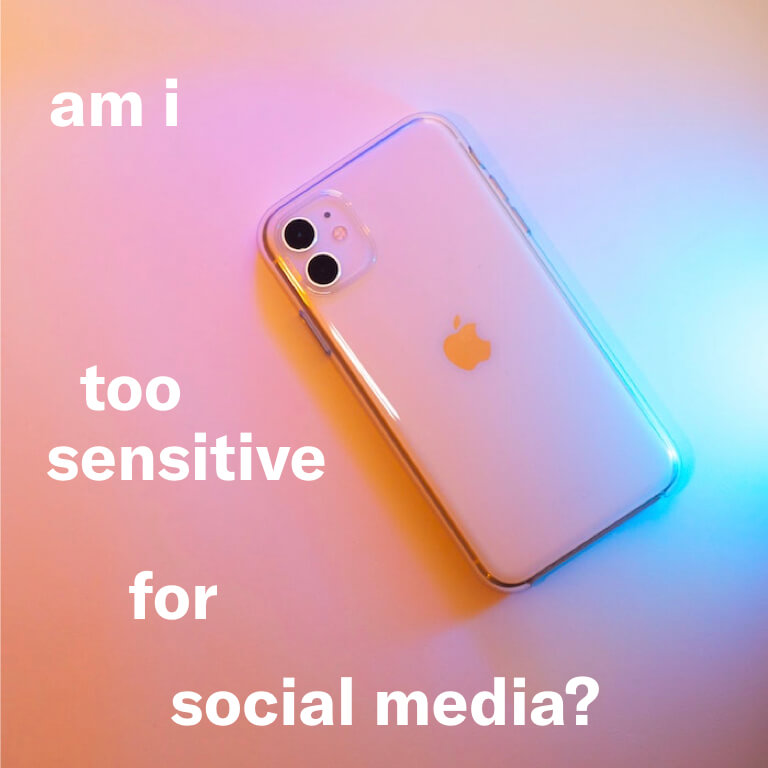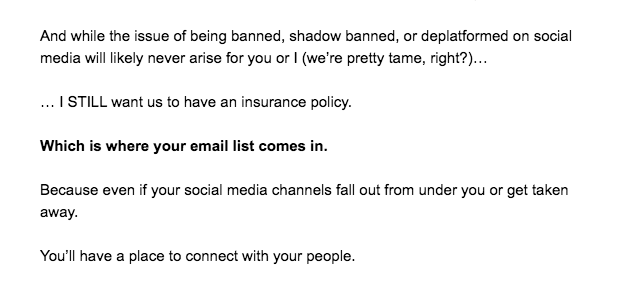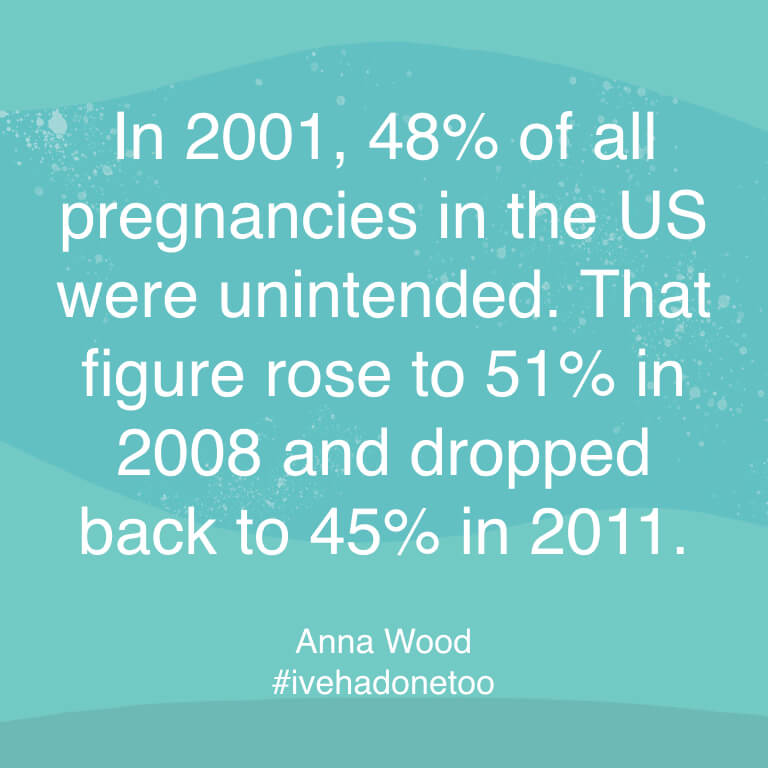Are you too sensitive for social media? If you find social triggering, Elyssa Jakim shares how sensitive types can make it work for you.

Last summer, I deleted my Instagram account. Because, I just felt awful on there. Every time I posted, it felt like a secret cry for help. A cry of “Please like me! Please approve of me! Please validate that I’m not too weird or too much for you.”
Rewind.
When I was growing up, I was often called too sensitive. I had a reputation for crying easily. This was doubly excruciating because when I cried, my face would get as bright red as my hair. It was like walking down the halls of my high school wearing a sign that said, “I just cried, and don’t wanna talk about it!”
Over the years, my sensitivity has paid off as intuition. Having a solid meditation practice and making a point to be extra kind to myself helps, and I feel less sensitive now than I did as a kid – but my empathic tendencies can still turn social interactions into triathlons. I know that I’m not the only one who’s feeling it these days. A tendency to feel things deeply, to overthink the effect you have on others, to use the phrase “I feel,” or to easily get sensory overload are all signs that you are a sensitive person. When mixed with social media, the effects can be disastrous.
My breakup with Instagram was simple, really. My husband noticed my habit of scrolling with glazed eyes while holding my breath.
He reflected back to me what he saw, “It’s like you’re in rabid panic mode when you’re on there.” He was right. My energy felt totally off when I interacted with Instagram. I’d hold my breath as I scrolled through the accounts of people I didn’t remember following. I’d obsessively refresh to see if I’d gotten another like. Shame poured in when a post I spent an hour on got two comments. It felt like walking back into my high school cafeteria with my bright red face. I didn’t feel like me.
So I deleted my account and really it felt like a solution! For a little while…
But it didn’t solve my problem, especially as an entrepreneur. For sensitives who use social media as a place to market their businesses and services, the imperative to remain on social media as a promotional tool poses a real challenge.
It wasn’t until I set the old way of doing things free—deleting my Instagram account and determining to reset that relationship—that new ways to engage with social media have opened up for me.
Read on for my tips on feeling strong as a sensitive on social media!
///
TIP 1: It’s not shady to be strategic.
Something that didn’t occur to me until I started a job writing social media captions for someone else is that there is a proven strategy at play. In fact, as a creative, intuitive person, it pained me to learn that if you’re not being strategic as a business owner on social, you’re very likely wasting your time and money.
Social media expert Eduardo Morales (the genius behind @potteryforall, @macramemakers, and @pinlord) tells us how important understanding the platform is for your success:
“I sincerely believe that growing a small business on Instagram isn’t about being ‘cool’ or ‘social’, it’s about understanding how the platform works and learning to execute the activities that lead to growth at a high level.”
Once you learn how the system works, you won’t feel like you’re floating around on social media without a life-raft. Having a plan in place will also make you feel less sensitive and raw.
Even if you’re just using social media personally, there are ways for you to strategize. For example, listen to your natural rhythms. If there are days in the week or times in your monthly cycle where you feel more vulnerable or tender…those might be the days to avoid using it. Also understanding the tools and tricks other people are using there helps you take things less personally. Knowing IG’s rules for instance, and that most people are “playing the game” to a degree, keeps me from getting swept up in the comparison trap.
A key way to feel less sensitive on social is to see it less as an extension of you, a place to share your vulnerable authentic self, and reframe it as a tool to share your passions, spread the work about your projects, and (perhaps most importantly) build community.
A key question is to ask yourself what your goals/intentions are. Why do you want to use social? Think about incorporating a strategy that can help you to reach those goals or nurture those intentions.
As you define your rules for using social media, you get to have a kind of internal boundary with the platform. Having a plan in place will also make you feel less sensitive and raw. You can then come from a place of power.
TIP 2: You DON’T have to be everywhere
IMPORTANT: You do NOT have to be active on every platform. Pick one or two channels and focus on those.
In this awesome article which unpacks if social media is even worth it, Melyssa Griffin lays it down:
“DO you need to be on every platform? Spending hours per week on social media? Heck to the mother-effin’ no. Find your core social media platforms and go hard on those instead. It may even just be one platform that you’re particularly active on.”
How do you know the best channels for you to choose?
There are many ways to go about this! Here are some ideas:
– Identify where your target audience and your community are hanging out. What platform do your ideal clients and customers love to use? That’s where you should be!
– You can also consider what platform you naturally feel most comfortable on. If you don’t jive with IR or Facebook for instance, maybe consider LinkedIn, TikTok, or Pinterest. This is particularly challenging if you don’t agree with the practices of certain social media companies. I don’t have an answer to this gargantuan issue, except to educate yourself about privacy policies and log out of platforms whenever possible. This article about IG’s privacy policies is an informative read.
– Look at where you might have a mini-following already, I realized that over the years I’d built up a big network on LinkedIn. Because I’m a service provider and mainly use social for work, it really makes sense to connect with people on there. Also, the algorithm sorts by “relevant’ rather than “recent”…so that means your epic posts get to stay on people’s feeds and continue building traction. A great thing if you want to put more bang into your written posts.
– Consider your natural communication style. If you’re super visual, maybe you want to play with Pinterest. If you’re a bit of a performer, get on video and milk those IG lives, Facebook lives, or create your own Youtube channel. If you’re a writer, you may consider LinkedIn, Medium, or Twitter.
Ultimately, choose the one or two platforms that feel easiest to commit to. Make it easy on your sensitive self.
Tip 3: Fall in love with Email Instead
If you’re an entrepreneur, this little piece of advice is probably the most literally valuable takeaway for your business. Don’t use social media to stay on social media. Use social media to connect with your people on email!
Why? For starters, the Return on Investment (ROI) of an email blasts away the ROI of social media.
“When you look at the effectiveness of email compared to social media and take a peek at the ROI of each, it’s pretty clear that email is the winner. By a lot.” Jacinda Santora tells us in this breakdown of email versus social media.
The ROI of email marketing as of February 2021 is 4200%, meaning for every $1 spent on email marketing, the average return is $42. This epic article by legendary copywriter Laura Belgray spells out exactly how valuable email marketing can be.
Emails are close to the investment, so they have a HUGE impact on the success of your business. Emails are the growth engine of your business and the bridge to sales.
The reason why you can rock email as a sensitive person? Email is all about an intimate connection. A great email has the feeling of being written just for you. Emails are also a place to hone your storytelling skills and develop your voice. Another winning feature? Email is way less public than social media!
If you begin to see social media as a way to invite people into more intimate conversations on your email list…you might just strike gold.
Email also answers the question of what to do if you somehow find yourself banned from social media. It is happening to many people…not only those who are being hate speech. Or if your account gets hacked and you lose all your followers overnight.
Quiz Funnel Strategist Chanti Zak, explained why email is an insurance policy…inside this EMAIL:

If you make growing your email list your primary goal as a business owner on social media, you might just be thrilled by the results.
TIP 4: Outsource
If you’re reading this post and the thought of social just gives you heart palpitations but you are a business owner what do you do?
Outsource your social media.
That’s right. If you are in the position to hire someone to do your social, go for it.
If you’re not a position to hire someone, you can put your attention on:
– Growing your authority in your field by guest posting or getting on podcast
– Being that incredible word of mouth referral that everyone can’t wait to work with
– Joining groups and events where your target audience is hanging out
– Building an epic lead magnet like a Quiz to get people off of social and into your list! (See tip 3)
And if you’re looking for more ways to make your business sustainable off of social (particularly if you disagree with Instagram’s new 2021 privacy policies)…check out this podcast episode from Blair Badenhop.
TIP 5: Dealing with Criticism
When someone unfollows you, it’s actually a blessing. Your audience is getting more targeted and more specific to people who do want to hear from you. Way to go!
So if you’ve been playing small or vanilla on your social, because you want to be for everyone, one of the best things you can do is be you more fully. Sure, some people might unfollow you. But let me repeat: that is a blessing!
If you’re a business owner, a gift that you can give to your audience is actually saying who your stuff is not for. It will make you feel way more clear and specific.
Laura Belgray wrote the best post about “flouncing” (announcing an “unfollow”) I’ve ever seen.
These days, because everything feels so polarized, it may seem natural to write a post anticipating someone else’s criticism. Here’s the thing. You can decide to use social as a way to cultivate a community of people who are kind and supportive. If someone justifiably criticizes something you have posted, the best thing you can do is lead with kindness and a willingness to learn. If someone is attacking you or is behaving in a way that feels completely immature, unkind, or even abusive… then they are no longer welcome in your community.
Here’s how Laura begins her caption as a way to set a boundary for what she will and won’t tolerate: “The caption begins “It tickles me when people write ‘Unfollowing’ in the comments. Or when they email to tell me they’re unsubscribing…There’s a button for that. Click it and bye bye! ”
Getting clear and communicative about what good behavior looks like on social media helps to define what we will accept from others on the platform. Take the opportunity to set the tone.
TIP 6: Post within your comfort level. And be available for the tough conversations.
In full transparency, when conceptualizing this article, Team Numinous and I spoke about how to broach the topic of racism and inclusion in social media.
We were asking: is it okay to be triggered and fatigued by discussions about race on social media? When is it okay to disengage and tend to self-care, and when do you just have to be okay with being uncomfortable?
I admittedly am not an expert in this area. I have deleted the sentence I’m now writing like 20 times while trying to find the right words. I don’t feel that I have the right words here. But I’ve decided to be okay with being uncomfortable.
There is a certain amount of pressure to speak about this issue publicly. But this can become a) insensitive and b) performative. Especially if we think a social post is equal to “doing the work” internally as well as behind the scenes.
The best practice, if you feel uncertain about how to address these issues, is to find communities who “call you in” as opposed to promoting public shaming. Find the people who are broaching these issues in a way that inspires you and feels genuine.
Also be sure to do lots of other research off social media so you’re more versed in and less triggered by challenging conversations. Listen to podcasts and read books that talk about these issues from various viewpoints so you can digest the information in your own timeframe.
TIP 7: Remember that we need your sensitive self!
People may have called you sensitive as if it was an insult. But your sensitivity can be your strength. Especially as a business owner. When harnessed, your sensitivity becomes pure creativity and intuition.
Self-confessed sensitive business owner Asia Suler of One WIllow Apothecary has this to say about why sensitive people are great at business:
“You, in your introversion, in your sensitivity, in your empathic gifts are here to be a channel on this Earth. You are here to lead the way back to a more sane, heartfelt, and natural way of being. Beginning a business can seem scary, but it is also one of the most profound ways to shift the fabric of our reality. If we only stick with it, our businesses will show us the most precious thing of all— how to truly be ourselves.”
Being super sensitive actually makes you hard-wired to run a different kind of “business” than we are used to – one that moves to natural rhythms, one that creates its own rules, one that shapes society through the spirit of nurturance. As well as to grow a social media presence that feels fully authentic and right for you…whether or not you’re a business owner.
If the loudest most confident voices remain the only ones that get heard, then we forget that the world is FULL of sensitive people, who generally have a ton of love, healing, and guidance to give. And need your sensitivity on social media too!
///
Elyssa Jakim is a conversion copywriter and email strategist for coaches, course creators, personal brands, and conscious businesses. She focuses on marketing that is uplifting instead of anxiety-inducing. Elyssa just finished her M.F.A in screenwriting at UCLA. She’s also a confounder of NAMAH, biodynamic herb garden and meditation center devoted to the teachings of Paramhansa Yogananda. Follow her on LinkedIn and Instagram. And if you want to join her love-filled email community, click here to subscribe.


